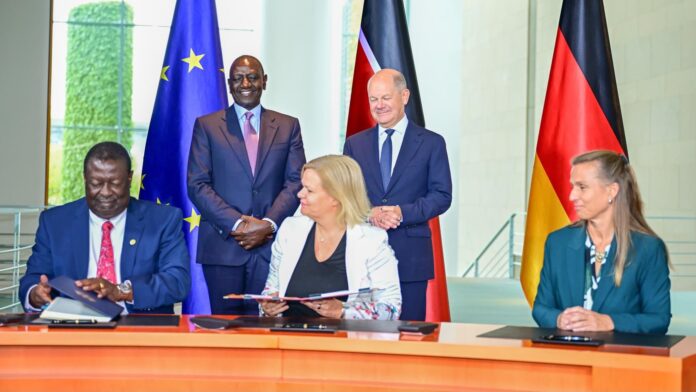The Federal Republic of Germany and the Republic of Kenya have signed a Comprehensive Migration and Mobility Partnership Agreement.
This agreement seeks to formalize labor mobility, facilitate the placement of Kenyan talent in Germany, and address urgent labor shortages in the German workforce.
The agreement holds significant implications for skilled workers, students, and apprentices. Under its provisions, eligible Kenyans will be granted long-stay visas for study or vocational training, with opportunities for work placements following graduation.
The temporary residence permits issued for these purposes can be extended if the recipient is actively pursuing their academic or vocational objectives, marking a robust commitment to fostering educational exchanges between the two nations.
Both governments have committed to prevent human trafficking and irregular migration by providing guidelines for safe and legal pathways for those seeking employment abroad.
What is the Labour Market Situation In Germany?
Germany’s labor market remains robust yet faces significant challenges, particularly in the wake of the ongoing digital transformation and demographic shifts.
According to recent data from the Federal Employment Agency, the country reported an unemployment rate of approximately 5.5%, a slight increase from 5.3% in 2022.
This uptick can be attributed to the economic adjustments following the COVID-19 pandemic and the impact of inflation.
The total number of employed persons reached around 45 million, marking an increase of 1.2% compared to the previous year.
However, the labor market is experiencing skill shortages, particularly in sectors like information technology, healthcare, and engineering. The IT sector, in particular, continues to struggle, with estimates indicating a shortfall of over 100,000 IT specialists.
Conversely, Kenya’s labor market presents a distinct profile. As of 2023, the unemployment rate in Kenya stands at approximately 5.8%, highlighting the country’s challenges in creating sufficient job opportunities for its growing population, which currently exceeds 55 million.
Most of Kenya’s workforce is employed in the informal sector, with about 83% of total employment categorized as informal, reflecting a significant gap in formal job creation.
The push for skilled migration has intensified, and the government is actively seeking to attract foreign talent to fill these gaps
President Ruto expressed gratitude for this collaborative effort, noting that the initiative would not only boost the Kenyan economy through remittances but also strengthen bilateral relations between the two countries.
As part of its commitment, Germany will offer assistance in recognizing qualifications obtained in Kenya, thereby easing the process for skilled workers to integrate into the German labor market. The agreement also outlines protocols for collaboration on labor market needs and the welfare of workers, ensuring that both governments can respond effectively to changes in the employment landscape.
In addressing returns and readmissions, the agreement establishes clear procedures to facilitate the safe return of nationals who do not meet residency requirements, thereby maintaining the integrity of each country’s immigration system.
Both countries are poised to leverage this agreement to enhance their economic outlooks while promoting fair labor practices.
The successful execution of this Comprehensive Migration and Mobility Partnership is expected to produce tangible benefits for both nations, making it a pivotal step in addressing the labor demands of Germany while providing promising opportunities for Kenya’s talent pool.



















